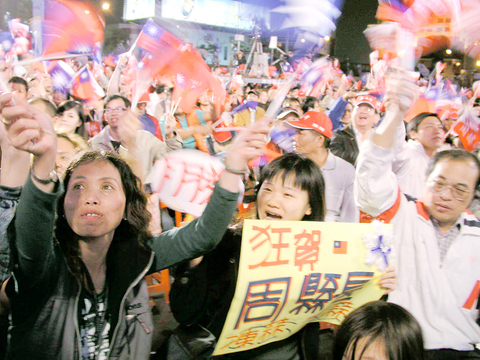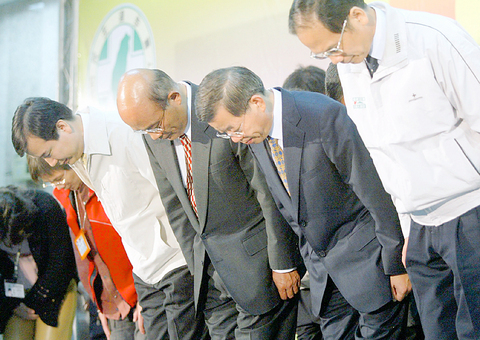The Chinese Nationalist Party (KMT) won a resounding victory over the Democratic Progressive Party (DPP) in yesterday's local government elections, in a win attributed to voter unhappiness with the DPP's poor performance and entanglement in recent scandals.
The KMT won 14 out of 23 city and county constituencies, while the DPP -- which previously controlled 9 counties and cities -- won just six seats.
Among the constituencies that changed hands from the DPP to the KMT were the traditional pan-green strongholds of Taipei and Ilan Counties. The DPP also lost Chiayi City, long an anti-KMT sanctuary during the days of Martial Law and the dangwai democracy movement.

PHOTO: LIN CHIN-CHI, TAIPEI TIMES
"This is not a triumph for the KMT but for the Taiwanese people," KMT Chairman Ma Ying-jeou (馬英九) said in a victory speech last night. "The DPP was not defeated by the KMT, but by itself."
Ma had said that he would resign if his party failed to get at least 11 candidates elected in the commissioner and mayoral polls.
Yesterday's vote was called a "three-in-one" election because it combined county commissioner and city mayor elections, county and city councilor elections and township chief elections.

PHOTO: LIN CHENG-KUN, TAIPEI TIMES
Although yesterday's elections were local government polls, the ruling and opposition parties considered the results crucial to gaining momentum ahead of the 2008 presidential election, raising the stakes in the contest.
In two key races, the Democratic Progressive Party's (DPP) Luo Wen-chia (
Relentless attacks
Although the KMT has often been criticized for its poor campaign strategy, analysts attributed the party's success to its relentless criticism of the government's poor record and tenacious pursuit of a recent string of scandals, including the Kaohsiung Rapid Transit Corp (KRTC) scandal and the "vultures" insider-trading case.
DPP Chairman Su Tseng-chang (蘇貞昌), who said that he would resign as chairman if Luo lost in Taipei County, or if the party failed to win at least 10 seats in the commissioner and mayoral polls, offered to resign last night.
Su said that his party accepted the election results, and he called on the public to continue to have faith in the DPP.
"The DPP has lost one election, but Taiwan cannot lose," Su said.
To express their regret over the defeat and accept responsibility for the outcome, Su, Presidential Office Secretary-General Yu Shyi-kun and Premier Frank Hsieh (謝長廷) bowed to the public three times.
66 percent turnout
The DPP garnered about 3.7 million votes -- around 42 percent of the total, while the KMT received 4.5 million votes, or about 51 percent. The Central Election Commission estimated the turnout to be approximately 66 percent of registered voters.
The DPP held on to its southern strongholds of Pingtung County, Tainan City and county and Kaohsiung County, while the KMT took control in northern, central and eastern Taiwan.
Three remote counties on outlying islands remained loyal to the pan-blue camp, with Penghu, Kinmen County and Lienchiang County -- the official administrative title for the Matsu archipelago -- all firmly controlled by the pan-blue alliance. Kinmen County went to the New Party, while Lienchiang County went to the PFP and Penghu went to the KMT.
The People First Party (PFP) captured one district, while the Taiwan Solidarity Union (TSU) came out of yesterday's vote empty-handed.
Blue north
In northern Taiwan, the KMT seized control in six districts, including Taipei, Taoyuan, Hsinchu and Miaoli counties as well as Hsinchu and Keelung Cities. The DPP captured none.
In central Taiwan, the KMT obtained six seats in Taichung, Changhua and Nantou counties and Taichung and Chiayi cities. The DPP captured Yunlin County and held on to Chiayi County.
Eastern Taiwan, which has long been controlled by the KMT, remained a pan-blue stronghold.
Hualien County went to the KMT, while a scandal-plagued former KMT member also won in Taitung County as an independent candidate.
Taitung Council Speaker Wu Chun-li (吳俊立) defeated two independent candidates to hold on to his seat. Wu, however, may be suspended from his post in accordance with the Law on Local Government Systems (地方制度法).
He was convicted of corruption by the High Court but has appealed the ruling. He has also been charged with vote-buying but is out on NT$1 million (US$29,800) bail.

CALL FOR SUPPORT: President William Lai called on lawmakers across party lines to ensure the livelihood of Taiwanese and that national security is protected President William Lai (賴清德) yesterday called for bipartisan support for Taiwan’s investment in self-defense capabilities at the christening and launch of two coast guard vessels at CSBC Corp, Taiwan’s (台灣國際造船) shipyard in Kaohsiung. The Taipei (台北) is the fourth and final ship of the Chiayi-class offshore patrol vessels, and the Siraya (西拉雅) is the Coast Guard Administration’s (CGA) first-ever ocean patrol vessel, the government said. The Taipei is the fourth and final ship of the Chiayi-class offshore patrol vessels with a displacement of about 4,000 tonnes, Lai said. This ship class was ordered as a result of former president Tsai Ing-wen’s (蔡英文) 2018

‘SECRETS’: While saying China would not attack during his presidency, Donald Trump declined to say how Washington would respond if Beijing were to take military action US President Donald Trump said that China would not take military action against Taiwan while he is president, as the Chinese leaders “know the consequences.” Trump made the statement during an interview on CBS’ 60 Minutes program that aired on Sunday, a few days after his meeting with Chinese President Xi Jinping (習近平) in South Korea. “He [Xi] has openly said, and his people have openly said at meetings, ‘we would never do anything while President Trump is president,’ because they know the consequences,” Trump said in the interview. However, he repeatedly declined to say exactly how Washington would respond in

WARFARE: All sectors of society should recognize, unite, and collectively resist and condemn Beijing’s cross-border suppression, MAC Minister Chiu Chui-cheng said The number of Taiwanese detained because of legal affairs by Chinese authorities has tripled this year, as Beijing intensified its intimidation and division of Taiwanese by combining lawfare and cognitive warfare, the Mainland Affairs Council (MAC) said yesterday. MAC Minister Chiu Chui-cheng (邱垂正) made the statement in response to questions by Democratic Progressive Party (DPP) Legislator Puma Shen (沈柏洋) about the government’s response to counter Chinese public opinion warfare, lawfare and psychological warfare. Shen said he is also being investigated by China for promoting “Taiwanese independence.” He was referring to a report published on Tuesday last week by China’s state-run Xinhua news agency,

‘NOT SUBORDINATE’: Only Taiwanese can decide the nation’s future, and people preserving their democratic way of life is not a provocation, President William Lai said Taiwan does not want China’s “one country, two systems,” and must uphold its freedom and democracy as well as resolve to defend itself, President William Lai (賴清德) said yesterday, rejecting Beijing’s latest bid to bring the country under Chinese control. The president made the remarks while attending a commissioning ceremony for Taiwan’s first battalion of M1A2T Abrams tanks in Hsinchu County’s Hukou Township (湖口). The tanks are made by General Dynamics, a major US defense contractor. China this week said it “absolutely will not” rule out using force over Taiwan, striking a much tougher tone than a series of articles in state media